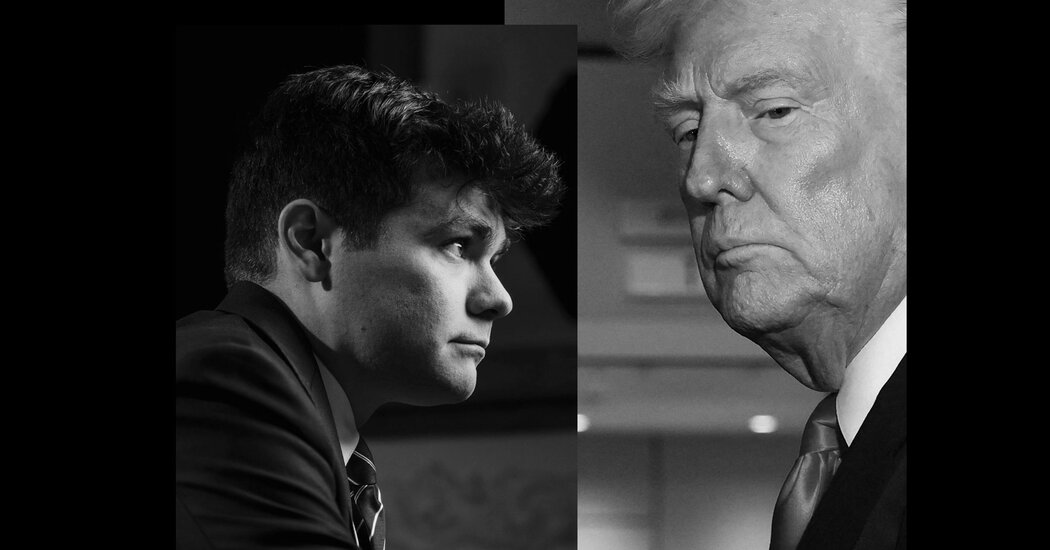Copyright The New York Times

Kevin Roberts, the president of the Heritage Foundation, must be confused. Last month, he turned to the most reliable move in the Republican crisis-management playbook, and it didn’t work. On Oct. 30, three days after his friend Tucker Carlson released a softball interview with Nick Fuentes, a Holocaust denier and perhaps the most notorious fan of Adolf Hitler in American public life, Roberts posted a video online that decried cancel culture. “We will always defend truth,” Roberts said. “We will always defend America, and we will always defend our friends against the slander of bad actors who serve someone else’s agenda.” “That includes Tucker Carlson,” Roberts continued, “who remains — and as I have said before — always will be a close friend of the Heritage Foundation. The venomous coalition attacking him are sowing division. Their attempt to cancel him will fail.” It’s hard to overstate how much this approach tends to work in the modern Republican Party. The hatred of the left — and of conservatives who are critical of Donald Trump — is so overwhelming that even the most basic acts of moral hygiene are considered weak or woke, or worse. Even if you are uncomfortable with the words or actions of your fellow Republicans, there is relentless pressure to swallow your tongue. There should be no enemies to your right. The left is the true existential threat to the United States. When Roberts, who was also a guiding force of Project 2025, recorded his video, he could be forgiven for thinking that neither Carlson nor Fuentes was particularly toxic on the right. After all, Carlson spoke at the 2024 Republican National Convention and at Charlie Kirk’s memorial service, and he hosts one of the top rated podcasts in the nation. Fuentes, for his part, dined with Trump at Mar-a-Lago along with Kanye West in 2022, and Marjorie Taylor Greene spoke at Fuentes’s America First Political Action Conference that same year. But Roberts miscalculated. His statement tore the Heritage Foundation apart. Facing a staff revolt, he issued a new statement more clearly condemning Fuentes (but still leaving Carlson alone), and when that didn’t quell the uprising, he held an all-staff meeting that quickly degenerated into an airing of grievances, with some Heritage employees eviscerating Roberts and passionately condemning the moral decline of the conservative movement and others — often with equal emotion — standing by his side. Roberts remains Heritage’s president and has vowed to stay, but senior foundation employees have resigned, the National Task Force to Combat Antisemitism has severed its ties with the group, and vast segments of the right are in open revolt against both Roberts and Carlson. Readers might be a little bit stumped. Wait, this is what’s splitting the right? A podcast conversation? It’s not that dialogues like this don’t matter (they do), but after everything that America has seen and endured since 2015, why now? The answer is rooted in part in the unstable bargain that millions of conservatives made with themselves and with America to keep supporting Trump. First, as a bit of background, Trump’s rise not only eviscerated the idea that there should be any kind of character test for participation in Republican politics, it also resulted in an aggressive, vicious purge from the party and the movement of anyone who attempted to hold Trump accountable for depravity and lawlessness. Some of us have even been told that we’ve abandoned our Christian faith for opposing Trump. Many of the conservatives who remained didn’t want to abandon the president, but they also didn’t want to completely abandon decency, either. So they chose a third way. Trump receives special dispensation (witness the much more muted response to Trump’s dinner with Fuentes, especially among Republican lawmakers), but standards still apply to everyone else. Other Republicans have to toe the line. You could see this dynamic in play more recently in the response to the Trump administration’s about-face on releasing the Epstein files. There was immense fury on parts of the right, but much of it was directed at Pam Bondi, the attorney general, and not at Trump, the man who now calls the lingering Epstein scandal a “Democrat hoax.” But this approach suffers from a fatal flaw. A movement, especially one that verges on an outright cult of personality, is defined by its leader, not by its rank and file. And when the leader is lawless and depraved, then efforts to contain his influence while preserving his power are doomed to fail. The proof is everywhere. Throughout the Trump era, many of the most prominent voices of right-wing America have only become shriller, angrier and, yes, more racist and more antisemitic. The right-wing media universe is culturally different in 2015 than it was in 2025 — substantially so. The balance of power has flipped upside down. The fringe has become mainstream, and the mainstream has become fringe. And now, with the end of Trump’s presidency coming into view, there is an increasing number of conservatives who fear that the movement has been and is being completely redefined — not just in Trump’s image, but in Carlson’s and Fuentes’s as well. And now some of these conservatives are speaking up. A great deal is riding on their ability to win this fight. Trump will not be president for a third term, and the question of who will represent the Republican Party in the years to come is of immeasurable importance. I want to believe that a large number of conservatives are in the process of waking up. They’re finally questioning what their movement has become. But I’m rather afraid that they’re too late. One sign that might be the case is that virtually every person who’s raised a voice against Carlson has a far smaller audience than he does. Since Carlson posted his interview with Fuentes less than two weeks ago on X, it has racked up almost 18 million views. On YouTube it has 5.6 million views. In fact, the Fuentes interview is already Carlson’s fourth most popular video, despite being online for less than two weeks. (If you’re wondering, his most popular one is his friendly interview with the even more vile Vladimir Putin.) To put those numbers in context, they top the viewership of his prime-time Fox News show, when he was the top-rated cable television host in America. Compounding the problem, there are many prominent right-wing influencers who won’t explicitly defend Carlson or Fuentes but will scold the people who are confronting them. Sean Davis, the chief executive of The Federalist, for example, attacked Ben Shapiro after Shapiro condemned both Carlson and Fuentes, writing, “Not really sure I’m willing to be lectured on who is allowed to talk to who and why by someone yukking it up with Jake Tapper, one of the most corrupt, hateful, and dishonest left-wing-operatives-masquerading-as-a-journalist in all of media.” Got that? We can’t condemn good old Tucker for elevating an actual fan of Hitler in front of many millions of people because that will distract from taking on the real enemy, Jake Tapper. I’m tempted to just laugh about it, but the stakes are too high and Davis’s sentiments are too popular for me to face the future with anything but real alarm. Making the problem worse, the fight for the future of the Republican Party is taking place only after many of its most thoughtful and decent members have been excommunicated. Millions upon millions of Republicans have been told that these brave men and women — Mitt Romney, Liz Cheney and Adam Kinzinger, to name just three — are traitors to the cause.



